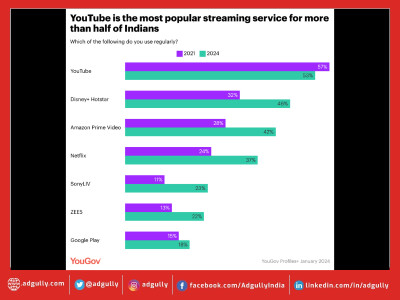AI has more benefits than drawbacks believe 71% urban Indians: WEF-Ipsos Survey
A new Ipsos survey for the World Economic Forum finds that, on average, six out of 10 adults from 28 countries expect that products and services using artificial intelligence will profoundly change their daily life in the next 3-5 years. Half of them feel it has already been the case in the past few years.
Meanwhile, 71% of the Urban Indians polled believe benefits of Artificial Intelligence far outweigh its drawbacks. One in two global citizens (52%) endorse this view, building a compelling case for AI – as per the WEF-Ipsos Global Opinions & Expectations about Artificial Intelligence Survey in 28 markets among 19,054 respondents. The markets most bullish on the prospects of AI were China (78%) and Saudi Arabia (76%). India was placed 3rd in the pecking order.
Opinions on AI
The overriding opinions on Artificial Intelligence (AI) among Urban Indians further reinforced their belief in AI: 74% said Products & Services using AI will profoundly change their lives in the next 3-5 years; 72% said they have a good understanding of what AI is; AI has more benefits than drawbacks.
Areas likely to be most impacted by AI
Urban Indians believe a number of areas could change due to AI – the top ones mentioned included Education & Learning new things (43%); Safety (40%), Employment (37%), Income (37%), among others.
Areas likely to improve due to AI
Urban Indians believe AI would have a positive impact primarily on entertainment (84%), education (82%), transportation (76%), safety (76%), shopping (74%), environment (71%), food & nutrition (71%), among others.
Commenting on the findings, Amit Adarkar, CEO, Ipsos India, said, “For a tech savvy and young country like India, it is not surprising that people foresee advantages of AI across so many diverse areas such as education, shopping, entertainment, banking, even medical assistance. Given our strong cultural emphasis on education, it is easy to relate to education/ learning as the top perceived area of AI impact. Understandably, Ed Tech takes the top pole position in the current start-up activity. For a resource deficit country like ours, AI could bring in a lot of positive changes through improving efficiencies across sectors.”
At a global level, majority of the people expect AI will make things better for them and their family with education and learning, entertainment, transportation, their home, shopping, safety, the environment, and food and nutrition. However, people across the world are evenly divided on the benefits of AI when it comes to their income, personal and family relationships, and employment (47%). Those who expect AI will improve their situation when it comes to the cost of living and to freedom and legal rights are a minority in most countries.
The survey highlights a clear divide between high-income and emerging countries in attitudes toward AI. Citizens from emerging countries are significantly more likely than those from more economically developed countries to report being knowledgeable about AI, to trust companies that use AI, and to have a positive outlook on the impact of AI-powered products and services in their life.
About the Study
These are the results of a 28-country survey conducted by Ipsos on its Global Advisor online platform. Ipsos interviewed a total of 19,054 adults aged 18-74 in the United States, Canada, Malaysia, South Africa, and Turkey, and aged 16-74 in 24 other markets, between November 19 and December 3, 2021.
The sample consists of approximately 1,000 individuals in each of Australia, Brazil, Canada, mainland China, France, Germany, Great Britain, Italy, Japan, Spain, and United States, and 500 individuals in each of Argentina, Belgium, Chile, Colombia, Hungary, India, Malaysia, Mexico, the Netherlands, Peru, Poland, Russia, Saudi Arabia, South Africa, South Korea, Sweden, and Turkey.
The samples in Argentina, Australia, Belgium, Canada, France, Germany, Great Britain, Hungary, Italy, Japan, the Netherlands, Poland, South Korea, Spain, Sweden, and the United States can be taken as representative of their general adult population under the age of 75.
The samples in Brazil, Chile, mainland China, Colombia, India, Malaysia, Mexico, Peru, Russia, Saudi Arabia, South Africa, and Turkey are more urban, more educated, and/or more affluent than the general population. The survey results for these countries should be viewed as reflecting the views of the more “connected” segment of their population.
The data is weighted so that each country’s sample composition best reflects the demographic profile of the adult population according to the most recent census data.
“The Global Country Average” reflects the average result for all the countries and markets where the survey was conducted. It has not been adjusted to the population size of each country or market and is not intended to suggest a total result.
Where results do not sum to 100 or the ‘difference’ appears to be +/-1 more/less than the actual, this may be due to rounding, multiple responses, or the exclusion of “don't know” or not stated responses.
The precision of Ipsos online polls is calculated using a credibility interval with a poll of 1,000 accurate to +/- 3.5 percentage points and of 500 accurate to +/- 5.0 percentage points. For more information on Ipsos' use of credibility intervals, please visit the Ipsos website. The publication of these findings abides by local rules and regulations.


















Share
Facebook
YouTube
Tweet
Twitter
LinkedIn